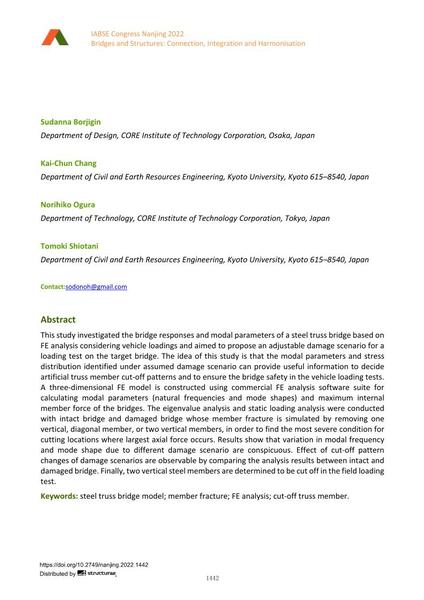Numerical Examination in Bridge Responses due to Fracture of Truss Member in a Steel Truss Bridge under Vehicle Loadings

|
|
|||||||||||
Détails bibliographiques
| Auteur(s): |
Sudanna Borjigin
(Department of Design, CORE Institute of Technology Corporation, Osaka, Japan)
Kai-Chun Chang (Department of Civil and Earth Resources Engineering, Kyoto University, Kyoto 615–8540, Japan) Norihiko Ogura (Department of Technology, CORE Institute of Technology Corporation, Tokyo, Japan) Tomoki Shiotani (Department of Civil and Earth Resources Engineering, Kyoto University, Kyoto 615–8540, Japan) |
||||
|---|---|---|---|---|---|
| Médium: | papier de conférence | ||||
| Langue(s): | anglais | ||||
| Conférence: | IABSE Congress: Bridges and Structures: Connection, Integration and Harmonisation, Nanjing, People's Republic of China, 21-23 September 2022 | ||||
| Publié dans: | IABSE Congress Nanjing 2022 | ||||
|
|||||
| Page(s): | 1442-1448 | ||||
| Nombre total de pages (du PDF): | 7 | ||||
| DOI: | 10.2749/nanjing.2022.1442 | ||||
| Abstrait: |
This study investigated the bridge responses and modal parameters of a steel truss bridge based on FE analysis considering vehicle loadings and aimed to propose an adjustable damage scenario for a loading test on the target bridge. The idea of this study is that the modal parameters and stress distribution identified under assumed damage scenario can provide useful information to decide artificial truss member cut-off patterns and to ensure the bridge safety in the vehicle loading tests. A three-dimensional FE model is constructed using commercial FE analysis software suite for calculating modal parameters (natural frequencies and mode shapes) and maximum internal member force of the bridges. The eigenvalue analysis and static loading analysis were conducted with intact bridge and damaged bridge whose member fracture is simulated by removing one vertical, diagonal member, or two vertical members, in order to find the most severe condition for cutting locations where largest axial force occurs. Results show that variation in modal frequency and mode shape due to different damage scenario are conspicuous. Effect of cut-off pattern changes of damage scenarios are observable by comparing the analysis results between intact and damaged bridge. Finally, two vertical steel members are determined to be cut off in the field loading test. |
||||
| Copyright: | © 2022 International Association for Bridge and Structural Engineering (IABSE) | ||||
| License: | Cette oeuvre ne peut être utilisée sans la permission de l'auteur ou détenteur des droits. |
||||
